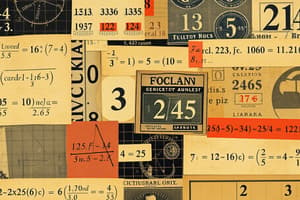Podcast
Questions and Answers
What is a numerical expression?
What is a numerical expression?
Contain a combination of numbers and operations such as addition, subtraction, multiplication, and division.
What does it mean to evaluate an expression?
What does it mean to evaluate an expression?
Finding the numerical value.
What does the Order of Operation acronym PEMDAS stand for?
What does the Order of Operation acronym PEMDAS stand for?
Parentheses, Exponents, Multiplication, Division, Addition, and Subtraction.
What is a variable in mathematics?
What is a variable in mathematics?
What is an algebraic expression?
What is an algebraic expression?
What does it mean to define a variable?
What does it mean to define a variable?
What does addition mean?
What does addition mean?
Which of the following is synonymous with subtraction?
Which of the following is synonymous with subtraction?
What does multiplication refer to?
What does multiplication refer to?
Which of the following words refers to division?
Which of the following words refers to division?
What are properties in mathematics?
What are properties in mathematics?
What is the Commutative Property of Addition?
What is the Commutative Property of Addition?
What is the Commutative Property of Multiplication?
What is the Commutative Property of Multiplication?
What does the Associative Property of Addition state?
What does the Associative Property of Addition state?
What does the Associative Property of Multiplication state?
What does the Associative Property of Multiplication state?
What is a counterexample?
What is a counterexample?
What does it mean to simplify an expression?
What does it mean to simplify an expression?
What is the Additive Identity?
What is the Additive Identity?
What is the Multiplicative Identity?
What is the Multiplicative Identity?
What does the Multiplicative Property of Zero state?
What does the Multiplicative Property of Zero state?
Flashcards are hidden until you start studying
Study Notes
Numerical Expressions
- Composed of numbers and operations: addition, subtraction, multiplication, division.
Evaluation
- The process of determining the numerical value of an expression.
Order of Operations
- Follow PEMDAS to solve expressions:
- Parentheses first
- Exponents next
- Multiplication and Division from left to right
- Addition and Subtraction from left to right
Variables
- Serve as placeholders representing any value in expressions.
Algebraic Expressions
- Combinations of variables and numbers, e.g., x + 2.
Defining a Variable
- Choosing a variable to represent a specific quantity in a verbal phrase. Common keywords:
- More than: (+)
- Decreased by: (-)
- And: (+)
- More than (multiplication): (x)
- Difference: (-)
Addition
- Terms related to addition include: plus, sum, more than, increased by.
Subtraction
- Terms related to subtraction include: minus, difference, less than, decreased by.
Multiplication
- Terms associated with multiplication include: times, product, multiplied, each, of, factors.
Division
- Terms related to division include: divided, quotient, per, rate, ratio, separate.
Properties of Numbers
- Properties are universal statements true for all numbers.
Commutative Property of Addition
- The sum remains the same regardless of the order of addends: a + b = b + a.
Commutative Property of Multiplication
- The product remains unchanged regardless of the order of factors: a x b = b x a.
Associative Property of Addition
- The grouping of addends does not affect their sum: (a + b) + c = a + (b + c).
Associative Property of Multiplication
- The grouping of factors does not affect the product: (a x b) x c = a x (b x c).
Counterexample
- An example used to demonstrate that a conjecture is false.
Simplification
- The process of rewriting an algebraic expression in a more manageable form.
Additive Identity
- Adding 0 to any number yields the number itself: a + 0 = a.
Multiplicative Identity
- Multiplying any number by 1 yields the number itself: a x 1 = a.
Multiplicative Property of Zero
- Any number multiplied by 0 equals 0: a x 0 = 0.
Studying That Suits You
Use AI to generate personalized quizzes and flashcards to suit your learning preferences.




